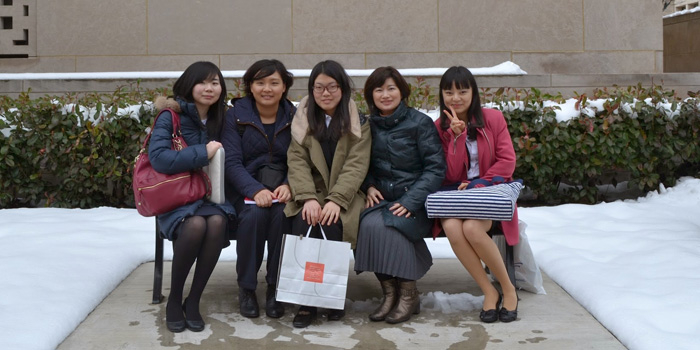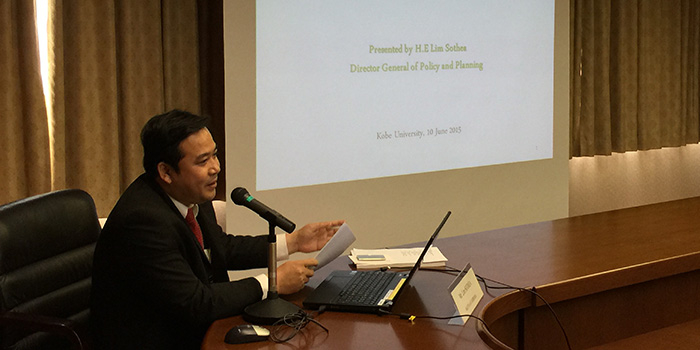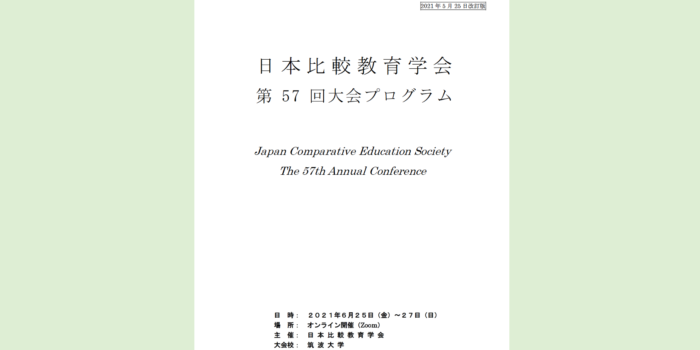During the spring vacation, I got the opportunity to conduct internship in Prof. Ogawa’s field study with seminar students.
Prof. Ogawa kindly made several appointments with educational related specialists in different international organizations, which based on our research interests.Dr. Shojo who is an alumni in Ogawa seminar currently an education specialist working at the World Bank gave us great help on our internship at World Bank. So we can smoothly processing our work at World Bank.
The very first day at the Bank, we had a meeting with Dr. Eduardo Velez Bustillo, who is also a visiting professor in Kobe University. Each student asked him questions based on our own research interests, discussed about current issues in education sector and expressed personal opinions as well. We also had a meeting with Prof. James Williams in George Washington University on the same day. He kindly asked everyone’s interests in our field and providing useful tips on our further studies. A student form GWU, showed us around the campus, which enable us to have a deeper understanding about American school life.
 In the following days, we are honored to have a meeting with Dr. Andreas Blom, who is a lead education economist, TTL of Uganda at World Bank and Ms Shwetlena Sbarwal. The lecture started with questions raised by Dr. Andreas Blom for students ‘ what you think matters about quality education, particularly in developing countries’, though our opinions varies, he combined our answers and concluded that teacher motivation, teaching experiences, payroll system are the main issues to improve the effectiveness of teachers; from the perspective of schools, leadership and local community participation should be strengthened. He also mentioned about the importance of school infrastructures which is my research interest as well, money should be used efficiently and really go to pupils. One more thing he mentioned is the lack of data on school facilities to better capture the impact, which I can’t agree more. Personally, I expect more space in this field. Last but not least, he introduced GPE program to us and included each one of us in the discussion and attracted everyone’s attention on his presentation. Ms Shwetlena Sbarwal, who is Dr. Andreas Blom’s colleague later on talked about PPP project in African countries. The solutions adopted in this program sounds great, one is to put double shift in education system, the other one is to merge public schools with private ones reducing school resources pressure. Frankly speaking, these are wonderful ideas but the implementation might be a challenge for the stakeholders. Policy implementations take times, Let’s see, couple of years later, it might be a success and introduced to more developing countries. Next day, Prof. Ogawa guided us to FHI 360, where we had career seminar with 20 students from Harvard University. Most of us are quite interested in working at international organizations, so we posed many questions regarding recruitment and our curiosity on FHI 360. Luckily, after the seminar, we had a lunch with Dr. Mark Ginsburg who is a senior technical advisor for research, evaluation, and teacher education in FHI 360, yummy Thailand food and deep-going conversation with him left me an unforgettable memory. Back to World Bank, Dr. Harry Patrinos and his colleagues delivered informative presentations to us. Harry Patrinos is a lead education economist at the World Bank. He specializes in all areas of education, especially school-based management, demand-side financing and public-private partnerships. Their presentations delivered us updating and hot issues on education development in the current century. Visits on IMF, IDB, USAID also impressed me a lot, making the field study a stimulating and rewarding experience that I ever had before.
In the following days, we are honored to have a meeting with Dr. Andreas Blom, who is a lead education economist, TTL of Uganda at World Bank and Ms Shwetlena Sbarwal. The lecture started with questions raised by Dr. Andreas Blom for students ‘ what you think matters about quality education, particularly in developing countries’, though our opinions varies, he combined our answers and concluded that teacher motivation, teaching experiences, payroll system are the main issues to improve the effectiveness of teachers; from the perspective of schools, leadership and local community participation should be strengthened. He also mentioned about the importance of school infrastructures which is my research interest as well, money should be used efficiently and really go to pupils. One more thing he mentioned is the lack of data on school facilities to better capture the impact, which I can’t agree more. Personally, I expect more space in this field. Last but not least, he introduced GPE program to us and included each one of us in the discussion and attracted everyone’s attention on his presentation. Ms Shwetlena Sbarwal, who is Dr. Andreas Blom’s colleague later on talked about PPP project in African countries. The solutions adopted in this program sounds great, one is to put double shift in education system, the other one is to merge public schools with private ones reducing school resources pressure. Frankly speaking, these are wonderful ideas but the implementation might be a challenge for the stakeholders. Policy implementations take times, Let’s see, couple of years later, it might be a success and introduced to more developing countries. Next day, Prof. Ogawa guided us to FHI 360, where we had career seminar with 20 students from Harvard University. Most of us are quite interested in working at international organizations, so we posed many questions regarding recruitment and our curiosity on FHI 360. Luckily, after the seminar, we had a lunch with Dr. Mark Ginsburg who is a senior technical advisor for research, evaluation, and teacher education in FHI 360, yummy Thailand food and deep-going conversation with him left me an unforgettable memory. Back to World Bank, Dr. Harry Patrinos and his colleagues delivered informative presentations to us. Harry Patrinos is a lead education economist at the World Bank. He specializes in all areas of education, especially school-based management, demand-side financing and public-private partnerships. Their presentations delivered us updating and hot issues on education development in the current century. Visits on IMF, IDB, USAID also impressed me a lot, making the field study a stimulating and rewarding experience that I ever had before.
All in all, I truly appreciated Prof. Ogawa giving me this opportunity from the bottom of my heart. I benefited hugely from those meeting and conversations with the world top specialists, but the soft skills to build net-work and communicating smartly with others as well.
By Huayu Kan
Related






